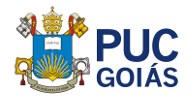Use este identificador para citar ou linkar para este item:
https://repositorio.pucgoias.edu.br/jspui/handle/123456789/6030Registro completo de metadados
| Campo DC | Valor | Idioma |
|---|---|---|
| dc.creator | Santos, Geanne Dias dos | pt_BR |
| dc.date.accessioned | 2023-06-27T11:57:53Z | - |
| dc.date.available | 2023-06-27T11:57:53Z | - |
| dc.date.issued | 2023-06-15 | - |
| dc.identifier.uri | https://repositorio.pucgoias.edu.br/jspui/handle/123456789/6030 | - |
| dc.description.abstract | The illegal trade in animals is the third most lucrative illicit activity in the world, second only to drug trafficking and arms trafficking. To identify these commercialized animals, molecular markers can be used for forensic analysis. These markers play a key role in species identification, as morphological markers are often not visible for identification. Using the integrative review, it is possible to obtain bibliographic information on scientific production on a given topic. Therefore, the objective of this study was to carry out an integrative analysis of studies related to the use of molecular genetic analysis in cases of illegal animal trade. The review was carried out using five articles selected from the Scopus database. To search for articles, the terms “forensic identification” AND animal AND “illegal trade” were used, and data were collected, such as: year; kind of work; authors; scientific magazines; molecular markers; species studied; purpose and outcome of work. The analyzes of the results were described in tables. The years of selected publications ranged from 2008 to 2012 published in two scientific journals: Forensic Science International Genetics and Journal of Forensic Sciences. Australia (n = 3) was the country that obtained the highest number of publications and the number of citations of the selected articles ranged from 20 to 45. The objective of most studies was to identify the species through molecular techniques and found that the techniques Molecular tests managed to fulfill the role of identifying species through traces. The molecular markers used in the articles were SNPs, mitochondrial DNA, Mini-barcoding and PCR-RFLP. It is noticed that molecular markers are the most recommended and effective to identify traces of species. The information generated by forensic molecular markers is necessary to solve legal and police problems associated with crimes against fauna, aiming at the identification and recovery of species. | pt_BR |
| dc.description.sponsorship | Não recebi financiamento | pt_BR |
| dc.language | por | pt_BR |
| dc.publisher | Pontifícia Universidade Católica de Goiás | pt_BR |
| dc.rights | Acesso Aberto | pt_BR |
| dc.subject | Marcadores moleculares | pt_BR |
| dc.subject | Produção científica | pt_BR |
| dc.subject | Tráfico de animais | pt_BR |
| dc.title | Análise forense como ferramenta molecular para identificação de animais silvestres: uma revisão integrativa Goiânia | pt_BR |
| dc.title.alternative | Análise forense molecular de animais silvestres | pt_BR |
| dc.type | Trabalho de Conclusão de Curso | pt_BR |
| dc.creator.Lattes1 | http://lattes.cnpq.br/4585931532715633 | - |
| dc.contributor.advisor1 | Rodrigues, Flávia Melo | pt_BR |
| dc.contributor.advisor1ID | https://orcid.org/0000-0002-2557-6570 | pt_BR |
| dc.contributor.advisor1Lattes | http://lattes.cnpq.br/9807251305319061 | pt_BR |
| dc.contributor.referee1 | Telles, Mariana Pires de Campos | pt_BR |
| dc.contributor.referee1ID | https://orcid.org/0000-0002-9023-0007 | pt_BR |
| dc.contributor.referee1Lattes | http://lattes.cnpq.br/4648436798023532 | pt_BR |
| dc.contributor.referee2 | Uchoa, Elza Maria Gonçalves Santos | pt_BR |
| dc.contributor.referee2Lattes | http://lattes.cnpq.br/2078778657685103 | pt_BR |
| dc.description.resumo | O comércio ilegal de animais é a terceira atividade ilícita mais lucrativa do mundo, ficando atrás apenas para o tráfico de drogas e tráfico de armas. Para identificação destes animais comercializados pode ser utilizado marcadores moleculares para análises forenses. Esses marcadores exercem um papel fundamental na identificação de espécies, já que muitas vezes marcadores morfológicos não estão visíveis para identificação. Fazendo o uso da revisão integrativa é possível obter informações bibliográficas da produção científica em uma determinada temática. Sendo assim o objetivo deste estudo foi realizar uma análise integrativa dos estudos relacionados ao uso da análise genética molecular em caso de comércio ilegal de animais. A revisão foi realizada por meio de cinco artigos selecionados na base de dado Scopus. Para busca dos artigos foram empregados os termos “forensic identification” AND animal AND “illegal trade” e coletados dados tais como: ano; tipo de trabalho; autores; revistas científicas; marcadores moleculares; espécies estudadas; objetivo e o resultado dos trabalhos. As análises dos resultados foram descritas em tabelas. Os anos das publicações selecionadas variaram de 2008 a 2012 publicados em duas revistas científicas: Forensic Science International Genetics e Journal of Forensic Sciences. A Australia (n = 3) foi o país que obteve maior número de publicações e o número de citações dos artigos selecionados variaram de 20 a 45. O objetivo da maioria dos estudos foi identificar as espécies por meio de técnicas moleculares e constataram que as técnicas moleculares conseguiram cumprir o papel de identificar as espécies por meio de vestígios. Os marcadores moleculares utilizados nos artigos foram PCR sequencial e PCR-RFLP. Percebe-se que os marcadores moleculares são os mais recomendados e eficazes para identificar vestígios das espécies. As informações geradas pelos marcadores moleculares forenses são necessárias para resolver problemas jurídicos-policiais associados à crimes contra a fauna visando a identificação e a recuperação das espécies. | pt_BR |
| dc.publisher.country | Brasil | pt_BR |
| dc.publisher.department | Escola de Ciências Médicas e da Vida | pt_BR |
| dc.publisher.initials | PUC Goiás | pt_BR |
| dc.subject.cnpq | CNPQ::CIENCIAS BIOLOGICAS::GENETICA | pt_BR |
| dc.creator.Lattes | http://lattes.cnpq.br/4585931532715633 | pt_BR |
| dc.degree.graduation | Ciências Biológicas - Bacharelado | pt_BR |
| dc.degree.level | Graduação | pt_BR |
| Aparece nas coleções: | TCC Ciências Biológicas - Bacharelado | |
Arquivos associados a este item:
| Arquivo | Tamanho | Formato | |
|---|---|---|---|
| TCC Geanne 26-06-23.pdf | 1,15 MB | Adobe PDF | Visualizar/Abrir |
Os itens no repositório estão protegidos por copyright, com todos os direitos reservados, salvo quando é indicado o contrário.
Ferramentas do administrador
